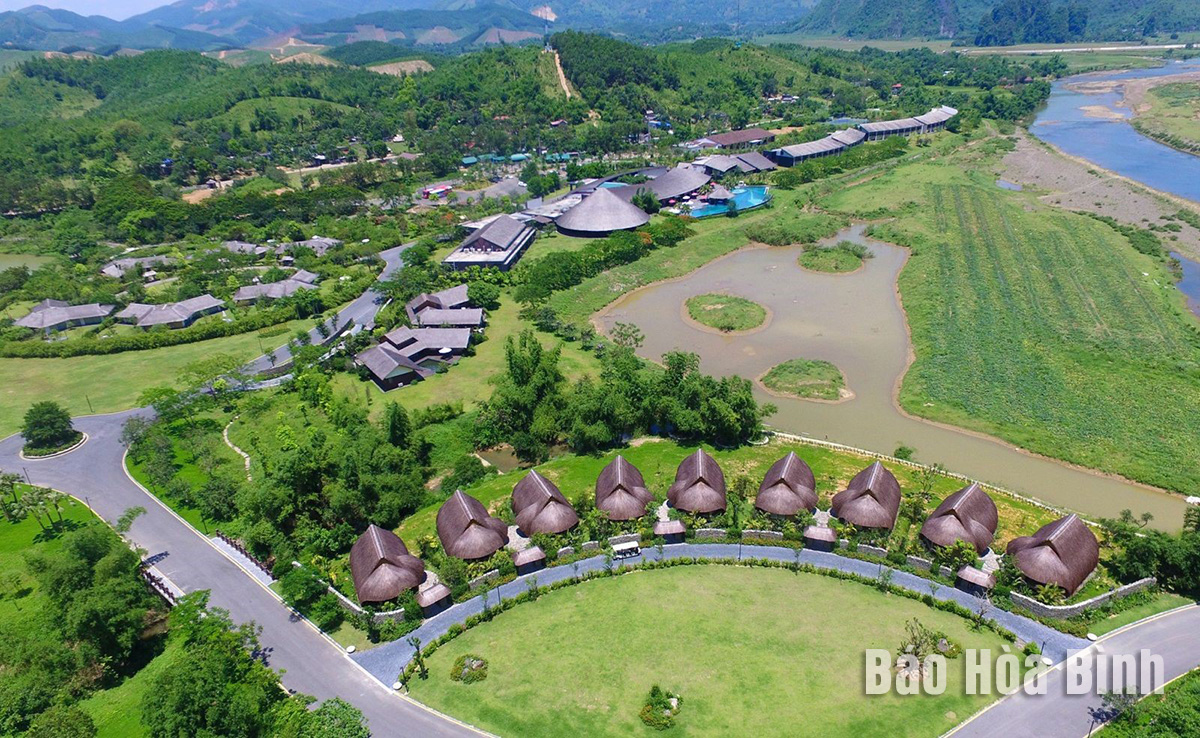
Kim Boi district, Hoa Binh province, has completed its regional planning until 2040, and worked on the construction planning for 14 communes, three zoning planning, and nine detail planning for rural residential areas, according to Tran Tuan Son, Vice Chairman of the district People’s Committee.
Son said that the locality has actively designed 25 other planning to lay the foundation for the management of construction activities and the attraction of investment capital, thus promoting the local socio-economic development and mobilising resources for the district’s long-term growth.
Serena Resort Sao Bay has been an outstanding tourist site in Kim Boi.
Under the district planning, Kim Boi is divided into three regions. Region 1 comprises five communes of Binh Son, Du Sang, Tu Son, Vinh Tien, and Dong Bac, focusing on developing resort tourism, cultural tourism, and industrial clusters with a total area of 14,155 hectares.
Region 2 consists of Bo townships and Vinh Dong, Kim Boi, Hop Tien, Xuan Thuy, Hung Son and Kim Lap communes, aiming to boost urban development, resort tourism and health care services associated with hot mineral water resource exploitation, which has a total area of about 26,981 hectares. Bo township will be developed into a four-tier urban area.
Meanwhile, Region 3 gathers five communes of Nam Thuong, Sao Bay, Cuoi Ha, Nuong Dam and My Hoa, focusing on developing high-tech agriculture, resort tourism, and eco-tourism, with an area of about 13,972 hectares.
Currently, a 16.31-km section of the Hoa Binh-Ha Noi road and Son La expressway connecting Hoa Binh and neighbouring Son La province crossing Kim Boi have been built, helping optimise the mineral water resources of Kim Boi and creating a development space for the district.
In order to promote its advantages, Kim Boi is calling for businesses to invest in eight hot mineral water spots. As of April, the district had attracted many projects, including Venus Resort that covers nearly four hectares in Coc village of Vinh Dong commune, the cultural tourism and resort complex in Cuoi Ha commune and Kim Boi commune, and Apec Mandala Sky Villas Kim Boi in Mo Da village of Bo township.
The district currently has 46 tourist accommodation establishments, including three resorts, two hotels, 41 motels with a total of 798 rooms and 1,077 beds. In the first quarter of 2024, Kim Boi district welcomed 15,080 tourists, earning 22 billion VND (866,569 USD).
Along with tourism development, the district has focused on expanding the "One Commune-One Product” (OCOP) programme. After six years of implementing, the district has developed 12 OCOP products, including two four-star products.
Nguyen Minh Anh, Vice Director of the district Agriculture and Rural Development Division said that the project to bring OCOP products into tourism activities has been actively responded by locals, helping promote the value of the products. She advised communes and townships in the district to make planning on concentrated production regions for OCOP products, while building OCOP introduction and selling booths that are easy for tourists to find.
Kim Boi is also creating open mechanisms and providing best conditions for investors in the locality in a bid to optimise its potential and strengths.
Hoa Binh province is undergoing a dynamic transformation amid Vietnam’s national digital transition. Building on Poliburo’s Resolution No. 57-NQ/TW on breakthroughs in science, technology, innovation, and national digital transformation, the province has rolled out a wide range of practical action plans. A standout initiative is the "Digital Literacy for All” movement, an effort to ensure that no one is left behind in the digital era.
Hoa Binh province is undergoing a dynamic transformation in the wake of the national digital transformation movement. Building on Resolution No. 57-NQ/TW of the Politburo on breakthroughs in science, technology, innovation, and national digital transformation, the province has implemented a wide range of practical action plans. A standout initiative is the "Digital Literacy for All” movement ambitious effort to ensure that no one is left behind in the digital age.
With a spirit of unity and proactive problem-solving, the Party Committee, the government and the people of Dong Lai Commune (Tan Lac District) have made great strides in implementing the resolutions of the 24th Party Congress of the commune for the 2020 - 2025 term. Focusing on leadership and practical actions, the commune has brought the Party’s resolutions into daily life, creating strong impacts and pushing the local development forward.
Amid the nationwide push for digital transformation, young people in Hoa Binh Province are stepping up as dynamic pioneers, applying technology to enhance Youth Union operations and expand the reach of youth-led initiatives. Through creativity and adaptability, Youth Union organizations at all levels have introduced a series of practical solutions, contributing to modern governance and community development.
In recent years, An Nghia commune, located in Lac Son district, has stepped up administrative reform, focusing on improving the quality and efficiency of its single-window service unit for receiving and processing administrative procedures. These improvements have helped create favourable conditions for local residents and organisations to handle administrative procedures, contributing to the commune’s broader socio-economic development.
The Prime Minister-approved master plan to develop the multi-use value of forests ecosystems through 2030, with a vision to 2050, aims to improve the management and sustainable use of forest resources, create jobs, increase incomes, and improve the living standards of ethnic minorities, people in mountainous and remote areas, forest workers and those living near forests.



